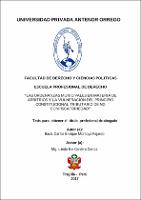Mostrar el registro sencillo del ítem
Las ordenanzas municipales en materia de arbitrios y la vulneración del principio constitucional tributario de no confiscatoriedad
| dc.contributor.advisor | Cantera Garcia, Linda Isis | |
| dc.contributor.author | Montoya Fajardo, Carlos Enrique | |
| dc.creator | Montoya Fajardo, Carlos Enrique | |
| dc.date.accessioned | 2018-01-19T14:53:03Z | |
| dc.date.available | 2018-01-19T14:53:03Z | |
| dc.date.issued | 2017 | |
| dc.identifier.uri | https://hdl.handle.net/20.500.12759/3453 | |
| dc.description.abstract | El presente trabajo de investigación titulado “Las ordenanzas municipales en materia de arbitrios y la vulneración del principio constitucional tributario de no confiscatoriedad” tiene como objetivo principal, determinar cómo es que la aprobación de arbitrios mediante ordenanzas municipales, sin disgregar los montos globales contenidos en el Informe Técnico de Distribución de Costos, vulnera al principio constitucional tributario de no confiscatoriedad. Para ello es que en el marco teórico se inicia definiendo a las Municipalidades como los principales Órganos de Gobierno Local, y cómo es que la Constitución les ha revestido de Potestad Tributaria para que puedan crear tributos en pro de financiar los servicios, bienes y proyectos en mejora de la sociedad. Se explica también los límites que esta Potestad Tributaria tiene que observar para evitar que el Estado vulnere las garantías de los contribuyentes, dichos límites son los Principios constitucionales Tributarios. Y finalmente se detalla cómo es que en la actualidad gobiernos locales, usan y abusan de esa potestad tributaria par a imponer arbitrios municipales, con montos exabruptos que no se adecuan al costo real del servicio vulnerando así el principio de no confiscatoriedad. | es_PE |
| dc.description.abstract | The present research work entitled ““The municipal ordinances on arbitration and the violation of the constitutional tax principle of non-confiscation““ has as its main objective, to determine how it is that the approval of excise taxes by municipal ordinances, without breaking the global amounts contained in the Technical Report of Distribution of Costs, violates the constitutional tax principle of non-confiscatory. For this reason, the theoretical framework begins by defining the Municipalities as the main Local Government Bodies, and how the Constitution has covered them with Tax Powers so that they can create taxes in order to finance the services, goods and projects in improvement of society. It also explains the limits that this Tax Authority must observe to prevent the State from violating the taxpayers' guarantees, these limits are the Constitutional Tax Principles. And finally it is detailed how it is that at present local governments, use and abuse that tax power to impose municipal taxes, with exabruptos amounts that do not adapt to the real cost of the service thus violating the principle of non-confiscation. | en_US |
| dc.description.uri | Tesis | es_PE |
| dc.format | application/pdf | es_PE |
| dc.language.iso | spa | es_PE |
| dc.publisher | Universidad Privada Antenor Orrego - UPAO | es_PE |
| dc.relation.ispartofseries | T_DERE_385 | |
| dc.rights | info:eu-repo/semantics/openAccess | es_PE |
| dc.source | Universidad Privada Antenor Orrego | es_PE |
| dc.source | Repositorio Institucional - UPAO | es_PE |
| dc.subject | Ordenanza municipal | es_PE |
| dc.subject | Principio constitucional | es_PE |
| dc.title | Las ordenanzas municipales en materia de arbitrios y la vulneración del principio constitucional tributario de no confiscatoriedad | es_PE |
| dc.type | info:eu-repo/semantics/bachelorThesis | es_PE |
| thesis.degree.level | Título Profesional | es_PE |
| thesis.degree.grantor | Universidad Privada Antenor Orrego. Facultad de Derecho y Ciencias Políticas | es_PE |
| thesis.degree.name | Abogado | es_PE |
| thesis.degree.discipline | Derecho | es_PE |
Ficheros en el ítem
Este ítem aparece en la(s) siguiente(s) colección(es)
-
Derecho [428]

